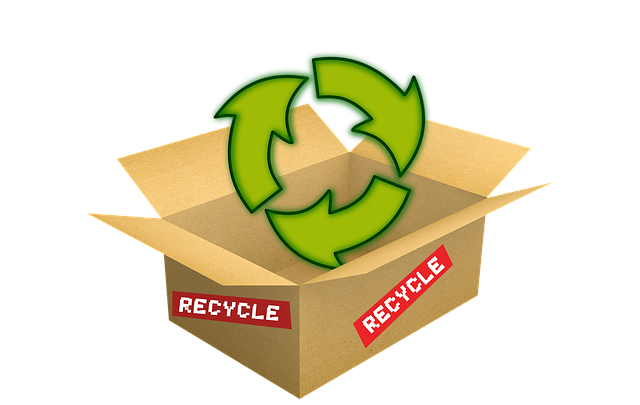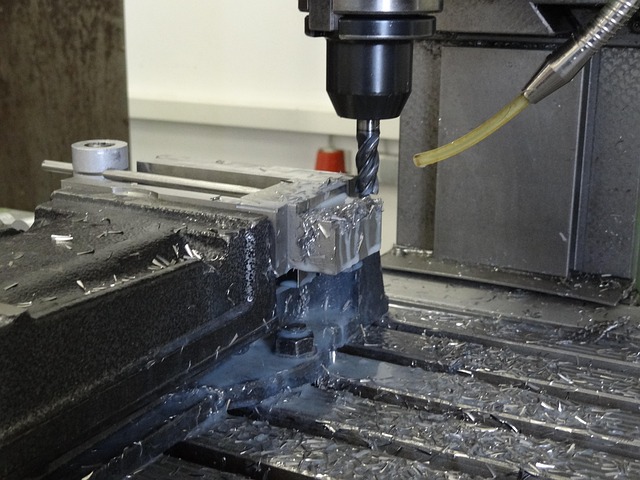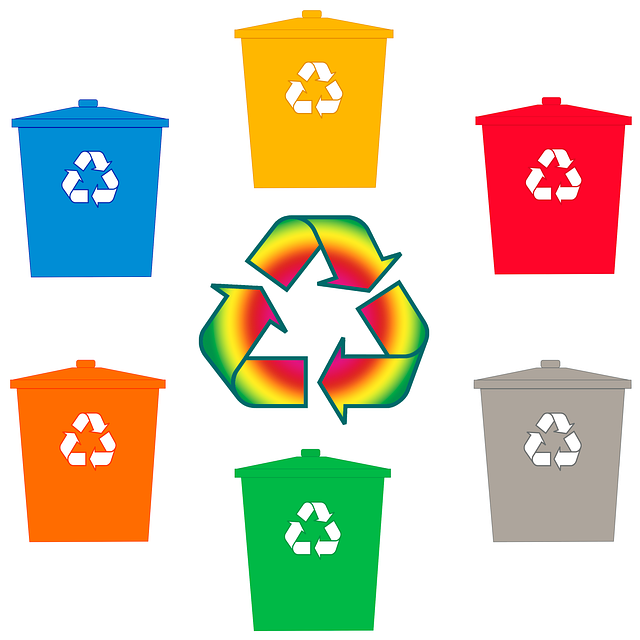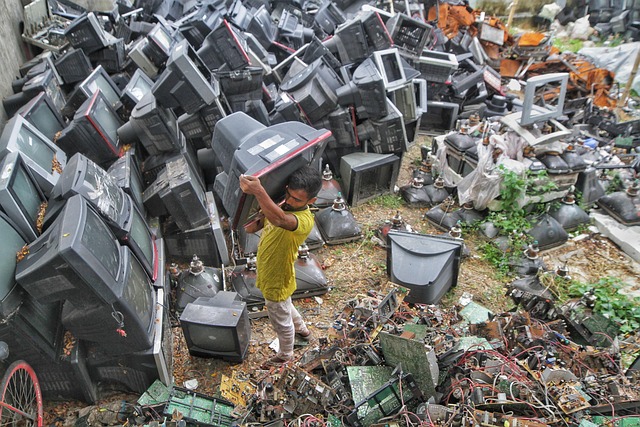Boston and New York City, as tech hubs, face e-waste challenges but also opportunities for startups to innovate in recycling. Proper disposal through programs like Boston's cyber trash collection and NYC's computer recycling can preserve the environment, meet waste management demands, and disrupt markets with sustainable practices. Startups can collaborate with local initiatives, adopt drop-off events, pick-up services, and office recycling stations to manage e-waste responsibly and promote a circular economy. By partnering with established facilities and adopting eco-friendly practices, startups can contribute to green image and economic opportunities in the e-waste sector. Effective management requires policies like deposit-return schemes and extended producer liability, with advocacy focusing on awareness and successful local programs.
In an era where technology advances at a rapid pace, startups face a significant challenge: managing electronic waste (e-waste) responsibly. This article explores comprehensive strategies for effective e-waste management, focusing on opportunities and initiatives in Boston and New York City. We delve into collection methods, partnerships with recycling facilities, technological innovations, and policy implications, empowering startups to contribute to sustainable practices while mitigating environmental impact. Discover how these approaches can transform e-waste from a liability into an asset.
- Understanding E-waste: Challenges and Opportunities for Startups
- Boston & NY: Exploring Local Recycling Initiatives
- Effective Collection Strategies for Startups in Urban Centers
- Partnering with Established Recycling Facilities: A Startup Guide
- Technological Innovations Shaping Sustainable E-waste Management
- Policy Implications and Advocacy for Responsible Recycling Practices
Understanding E-waste: Challenges and Opportunities for Startups

E-waste, a growing concern globally, presents both challenges and opportunities for startups in Boston and New York City. With rapidly advancing technology, these metropolitan areas generate significant amounts of electronic waste, including outdated computers, smartphones, and other digital devices. The primary challenge lies in proper disposal and recycling to prevent environmental damage caused by toxic substances leaching into soil and water bodies.
Startups in these tech-hub cities can capitalize on the opportunity to develop innovative solutions for e-waste management. Boston cyber trash collection and NYC large-scale computer recycling initiatives offer a glimpse into sustainable practices. By implementing efficient e-waste recycling programs, startups can contribute to a greener environment, meet the growing demand for responsible waste management, and potentially disrupt the existing market with their unique approaches.
Boston & NY: Exploring Local Recycling Initiatives

In the realm of e-waste management, both Boston and New York City (NYC) have emerged as leaders with unique recycling initiatives. Boston has implemented robust programs focusing on computer recycling for schools, ensuring that electronic waste from educational institutions is properly disposed of and recycled. This initiative not only promotes sustainable practices but also highlights the city’s commitment to environmental stewardship.
Meanwhile, NYC tech industry recycling initiatives have taken center stage, fostering a circular economy by encouraging responsible e-waste disposal. The city’s diverse landscape offers various avenues for residents and businesses to contribute to eco-friendly practices. These local efforts underscore the growing importance of proper e-waste management in both urban centers, setting an example for other regions to follow.
Effective Collection Strategies for Startups in Urban Centers

In urban centers like Boston and New York City, startups face unique challenges when it comes to e-waste management due to their high population densities and fast-paced tech scenes. Effective collection strategies are crucial for ensuring that electronic waste is responsibly disposed of or recycled. Startups can collaborate with local e-waste recycling programs specifically tailored to these metropolitan areas, such as those offered by Boston’s sustainable tech disposal services or New York City’s data center waste removal initiatives.
By partnering with established recycling centers and adopting innovative collection methods like drop-off events, pick-up services, or even in-office recycling stations, startups can significantly contribute to the circular economy while also reducing their environmental footprint. Utilizing these strategies not only helps in managing e-waste responsibly but also aligns startups with the growing demand for sustainable tech disposal practices in bustling cities like Boston and Manhattan.
Partnering with Established Recycling Facilities: A Startup Guide

Starting a tech venture in bustling cities like Boston or New York comes with a unique challenge—e-waste management. As these metropolises embrace digital innovation, they also generate significant volumes of electronic waste post events and everyday operations. For startups looking to contribute to sustainable electronics disposal, partnering with established e-waste recycling facilities is a strategic move.
Boston, for instance, boasts several reputable cyber waste collection programs that can handle large-scale recycling needs, including those from corporate events in the city or tech startup offices. Similarly, New York City has initiatives focused on responsible e-waste collection and processing. By aligning with these established practices, startups can ensure their electronic byproducts are handled efficiently while promoting a greener image and fulfilling their environmental responsibilities, especially when adopting eco-friendly practices as part of their brand identity.
Technological Innovations Shaping Sustainable E-waste Management

Technological innovations are reshaping sustainable e-waste management, with startups leading the charge in Boston and New York. These cities, known for their thriving tech scenes, have become hotspots for green tech disposal solutions. Startups are leveraging advanced recycling techniques and data-driven approaches to improve the efficiency of e-waste reduction processes.
For instance, Manhattan’s data center industry is embracing innovative methods to manage its e-waste, with some centers adopting robust hazardous waste collection schedules. Similarly, Boston startups are exploring new ways to extract valuable materials from electronic scraps, turning them into resources for future technologies. These efforts not only promote sustainable practices but also drive economic opportunities in the growing e-waste management sector.
Policy Implications and Advocacy for Responsible Recycling Practices

Effective e-waste management requires robust policies and advocacy for responsible recycling practices. Startups in cities like Boston and New York can play a pivotal role by collaborating with local authorities to develop comprehensive waste reduction strategies. Implementing deposit-return schemes, extending manufacturer responsibility, and promoting extended producer liability (EPL) are key policy implications that can encourage proper disposal and recycling of electronic devices.
Advocacy efforts should focus on raising awareness among businesses, especially those in the tech sector, about the importance of eco-friendly practices. Initiatives like Manhattan office equipment recycling or Boston office equipment salvage programs can serve as models for other cities. Furthermore, partnerships between startups, schools, and e-waste collection centers in Boston can facilitate computer recycling for schools, ensuring that electronic waste is managed responsibly while promoting educational opportunities around sustainability.
E-waste management presents a significant opportunity for startups to contribute to sustainable practices while addressing pressing environmental challenges. By understanding the unique aspects of e-waste, leveraging local initiatives in Boston and New York, implementing effective collection strategies, and embracing technological innovations, startups can play a crucial role in revolutionizing recycling. Additionally, partnering with established facilities and advocating for supportive policies will ensure responsible recycling practices across the industry. Integrating these strategies, from collection to policy, can foster a greener future for both urban centers like Boston and New York, and the global e-waste landscape.













